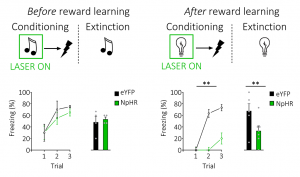Hot Off the Press – February 18, 2021
Past is prologue, at least that is the saying. Yet modern behavioral neuroscience, particularly in animals, strives to minimize the effect of past experience, using young and typically naïve subjects for testing. This is done in an effort to understand brain function without the confounding effects of prior training; however what if prior experience shapes how the brain processes new information, perhaps even changing the neural circuits critical to particular learning? The current study presents evidence to that effect, showing that the lateral hypothalamus – an area most famously required for feeding – becomes recruited to support fear conditioning as a result of prior appetitive learning. This concrete demonstration, and the other associated experiments, challenge the notion that there are sharp boundaries between the neural systems involved in different forms of learning.
Publication Information
Past experience shapes the neural circuits recruited for future learning Journal Article
In: Nature Neuroscience, 2021, ISBN: 1546-1726.

